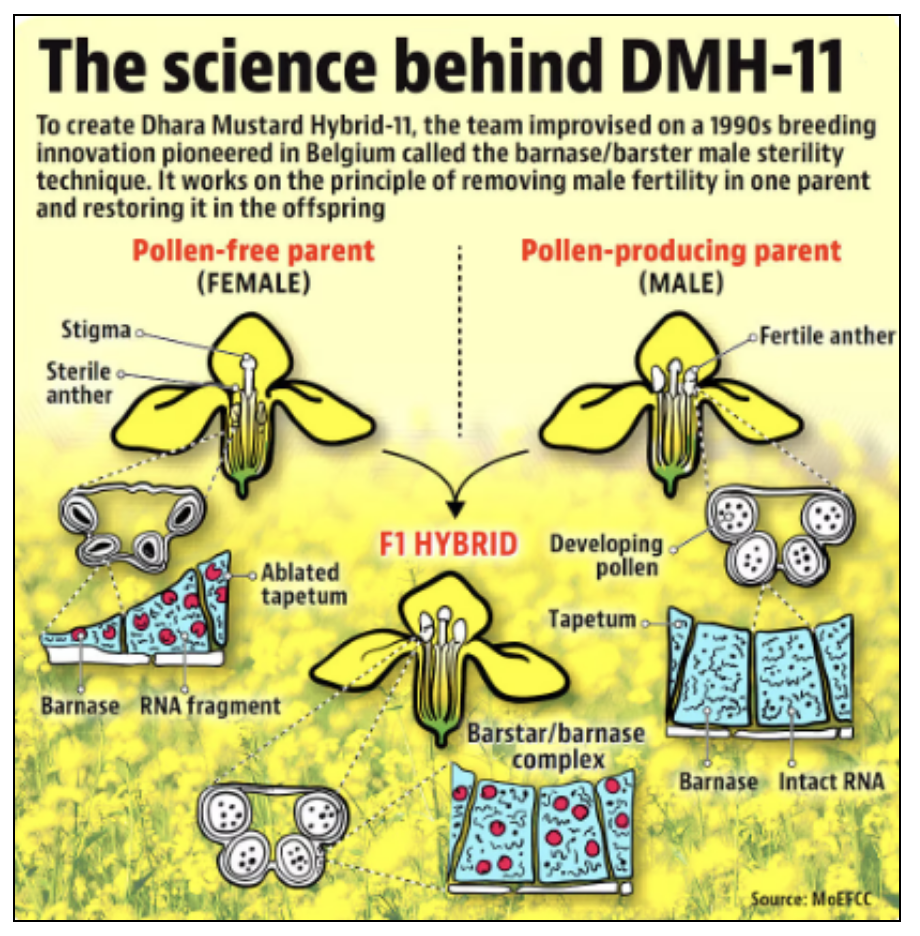News Excerpt:
Recently, the Supreme Court of India delivered a split verdict regarding the validity of the Centre's 2022 decision to grant conditional approval for the environmental release of genetically modified (GM) mustard crops.
More about the order:
- The court directed the Centre to develop a national policy concerning GM crops, encompassing aspects of research, cultivation, trade, and commerce.
- It should be formulated in consultation with all relevant stakeholders, including experts in agriculture and biotechnology, state governments, and representatives of farmers.
- The case will now be referred to a three-judge Bench, which the Chief Justice of India will constitute, to resolve the matter.
Background of the Case:
- The controversy stems from the October 18, 2022, recommendation by the Genetic Engineering Appraisal Committee (GEAC) to allow its environmental release.
- On October 25, 2022, the Centre approved the environmental release of the transgenic mustard hybrid DMH-11, a GM mustard variety.
GM Mustard (DMH-11):
- GM mustard, specifically the Dhara Mustard Hybrid-11 (DMH-11), is a genetically modified variety of the Indian mustard plant (Brassica juncea).
- It was developed using genetic engineering techniques, particularly the genetic male sterility (GMS) method, which involves the 'barstar-barnase' system.
- This system makes the plant herbicide-resistant, allowing farmers to control weeds by applying herbicides without damaging the crop.

Development of DMH-11:
- The hybrid mustard DMH-11 was developed by scientists at Delhi University's Centre for Genetic Manipulation of Crop Plants (CGMCP) using two genes from the soil bacterium Bacillus amyloliquefaciens.
- The Mustard flower is self pollinating as its flowers are bisexual. Hence , they use the following method to achieve Cross Hybridisation.
- The first gene, 'barnase', induces male sterility by impairing pollen production.
- This male-sterile plant is crossed with a fertile line containing the 'barstar' gene, which counteracts the barnase gene's effect, allowing seed production.
- The process, known as the barnase-barstar system, was used to hybridize the Indian mustard variety 'Varuna' with the East European 'Early Heera-2' mutant, resulting in DMH-11.
- This hybrid showed a 28% yield increase over Varuna in field trials.
Proposed benefits of DMH -11:
- Higher Yields: DMH-11 is reported to produce yields about 30% higher than existing mustard varieties. The current yield of mustard in India is around 1,000-1,200 kilograms per hectare, compared to a global average of over 2,000-2,200 kilograms per hectare.
- Impact on Honey Production: According to the South Asia Biotechnology Centre (SABC), GM mustard is expected to benefit honey bee populations due to enhanced foraging behavior, potentially increasing honey production and supporting beekeepers.
Concerns and Controversies:
- Environmental and Health Concerns: Critics are worried about the potential for increased use of herbicides, which could lead to herbicide-resistant weeds or "superweeds." There are also concerns about herbicide residues on crops.
- Impact on Honey Industry: Some honey cultivators fear that GM mustard could adversely affect honey production, potentially harming the livelihoods of farmers dependent on this industry. There is also a concern regarding behavioral changes in the local bee population due to a new variety of mustard.
- Political and Social Debate: The approval of GM mustard has sparked significant political debate in India, with various groups, including environmental activists expressing opposition.
|
Genetic Engineering Appraisal Committee (GEAC):
|


